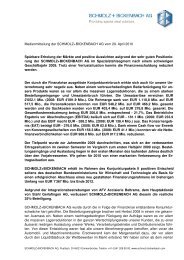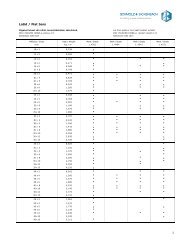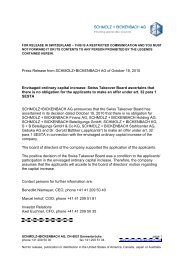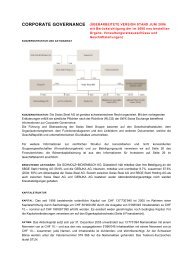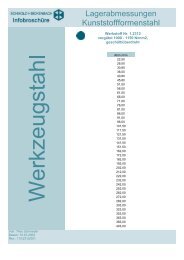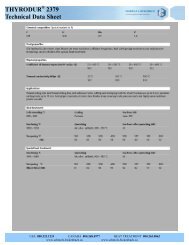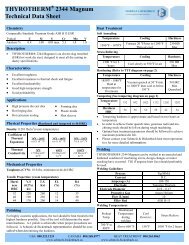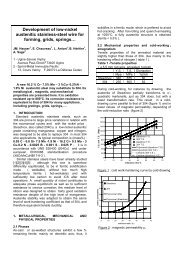Corporate Governance further improved. Management structure ...
Corporate Governance further improved. Management structure ...
Corporate Governance further improved. Management structure ...
You also want an ePaper? Increase the reach of your titles
YUMPU automatically turns print PDFs into web optimized ePapers that Google loves.
64<br />
* www.schmolz-bickenbach.com/en/<br />
investor-relations/corporate-governance<br />
3.5 responsibility and authority<br />
the Board of Directors is the highest governing body in the Group management <strong>structure</strong>, and rules on all matters that<br />
are not expressly entrusted to another governing body under law, the Articles of Incorporation* or the organisational<br />
Regulations*.<br />
the Board of Directors has delegated all tasks which are not assigned to it under law as nontransferable and irrevocable.<br />
the following tasks in particular constitute nontransferable and irrevocable tasks of the Board of Directors:<br />
_ overseeing the company and issuing the requisite directives;<br />
_ Defining the organisation of the Company;<br />
_ Structuring the accounting, financial controls and financial planning to the extent required for management of the<br />
company;<br />
_ Appointing and dismissing persons entrusted with the management and representation of business;<br />
_ Supervising persons entrusted with business management, in terms of compliance with the law, Articles of Incorporation,<br />
company regulations and directives;<br />
_ Drawing up the Annual Report, preparing und leading the General Meeting, and implementing its decisions;<br />
_ notifying the court in the event of overindebtedness;<br />
_ Deciding on the payment of subsequent contributions to nonfully paidup shares;<br />
_ Deciding on the level of capital increases and the associated amendments to the Articles of Incorporation;<br />
_ other nontransferable and inalienable duties, for example in relation to the Swiss Merger Law (FusG).<br />
the Board of Directors represents the highest governing body of the Company, supervises and controls the executive<br />
Board, and issues guidelines on business policy. It also defines the strategic objectives and general resources required to<br />
achieve them. All executive management tasks within the company and the Group which are not reserved for the Board of<br />
Directors or its committees are assigned to the executive Board. the Ceo chairs the executive Board, which consists of<br />
the Ceo, Coo and CFo. He issues supplementary guidelines governing the tasks and authorities of members of the executive<br />
Board and Business Unit <strong>Management</strong>. the Board of Directors is notified of these responsibilities and any subsequent<br />
changes no later than the next Board of Directors meeting. Members of the executive Board are appointed by the Board of<br />
Directors on the recommendation of the nomination and Compensation Committee, while other members of management<br />
(including Business Unit heads) are appointed by the executive Board. the Chairman of the Board of Directors monitors<br />
the implementation of measures approved by the Board of Directors, supervises the Ceo and his activities, and conducts<br />
regular performance appraisals with him.<br />
3.6 <strong>Management</strong> information and controlling instruments<br />
the management information and controlling function used by the Board of Directors to control the executive Board and<br />
the Business Unit <strong>Management</strong> includes a transparent management information system (MIS) which produces monthly,<br />
quarterly and endofyear reports on Group and business segment performance. every member of the Board of Directors<br />
may request information about any and all Company matters after informing the president of the executive Board to<br />
this effect. the executive Board informs the Board of Directors at every meeting on current business developments and<br />
significant business transactions. outside meetings, all members of the Board of Directors can request from the executive<br />
Board information about the progress of business and, with the authorisation of the Chairman, also about individual<br />
business transaction.



